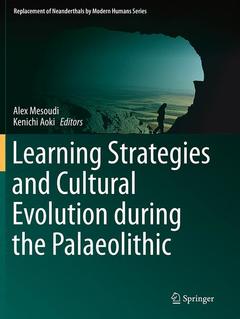Learning Strategies and Cultural Evolution during the Palaeolithic, Softcover reprint of the original 1st ed. 2015 Replacement of Neanderthals by Modern Humans Series

Alex Mesoudi is Reader in Anthropology at Durham University, UK. He conducts research into human cultural evolution and social learning. He uses a combination of lab experiments and theoretical models to explore the individual-level processes – who copies what, from whom and when – that underlie broad patterns of cultural change. He has authored over 40 peer-reviewed journal articles and book chapters and one previous book entitled “Cultural Evolution: How Darwinian Theory Can Explain Human Culture and Synthesize the Social Sciences” (University of Chicago Press, 2011).
Kenichi Aoki is Visiting Professor at Meiji University and Emeritus Professor at the University of Tokyo. He currently conducts theoretical research on cultural evolution and on the genetic evolution of learning strategies. He has also authored theoretical articles on group selection, gene-culture coevolution and mate choice. He is coeditor of two volumes focusing on the Neanderthal-modern human problem, “Neanderthals and Modern Humans in Western Asia” (Plenum Press, 1998) and “Dynamics of Learning in Neanderthals and Modern Humans Volume 1 Cultural Perspectives” (Springer 2013).
Explains how Palaeolithic cultures evolved
Suggests how cultural differences between hominin species contributed to replacement
Presents novel approaches and findings in a form accessible to advanced graduate students
Integrates concepts and methods from multiple traditional disciplines, including anthropology, archaeology, population biology and experimental psychology
Date de parution : 11-2016
Ouvrage de 169 p.
21x27.9 cm
Date de parution : 05-2015
Ouvrage de 169 p.
21x27.9 cm
Thème de Learning Strategies and Cultural Evolution during the... :
Mots-clés :
Acheulean Handaxe; Approximate Bayesian Computation; Copying Error; Cultural Evolution; Cultural Transition Versus Continuity; Cultural Transmission; Evolution of Teaching; Geographical Cultural Variation; Individual-based Simulation; Laboratory Experiment; Moran Model; Neanderthal to Human Replacement; North American Palaeolithic; Residential and Logistical Mobility; Semantic Axelrod Model; Social Learning
